| Code | Date | City | Fees | Register |
|---|---|---|---|---|
| T003 | June 9, 2024 - June 13, 2024 | Dubai – UAE | $ 5000 |
Register Course.. |
| T003 | September 1, 2024 - September 3, 2024 | Dubai – UAE | $ 3000 |
Register Course.. |
| T003 | December 8, 2024 - December 12, 2024 | Online | $ 1500 |
Register Course.. |
| T003 | March 23, 2025 - March 27, 2025 | Vienna | $ 5000 |
Register Course.. |
________________________________________________________________________________________________
Objectives
- By the end of this Course participants will be able to:
- Understand how sampling is used to monitor for compliance with regulations for water and wastewater effluent.
- Understand common sampling methods and procedures including grab samples, composite samples, and automatic sampler tools, and how to determine which procedure is appropriate based on the circumstance, including routine bacteriological sampling, full chemical analysis, sampling for THMs, influent sampling, primary clarifier sampling, mixed liquor sampling, and monitoring well sampling.
- Calculate the area, volume and time required to flush tanks and pipes.
- Understand the equipment and materials used for sampling, and the potential safety risks.
- Apply the concepts that guide a sampling plan, including chain of custody, and documentation.
- Apply quality management methods for quality assurance and quality control (QA/QC).
The Delegates
- Technicians & operators in a water treatment or water distribution system, an operator in a wastewater treatment facility, or responsible for water or effluent quality.
- Interested in moving into a laboratory testing role.
- Preparing for a certification exam or want to earn CEU credits that can be applied to water or wastewater systems continuing education requirements.
The Contents
- An Introduction To Water Quality :
- Characterisation of water bodies
- Definitions related to water quality
- Anthropogenic impacts on water quality
- Pollutant sources and pathways
- Spatial and temporal variations
- Economic development and water quality
- Strategies For Water Quality Assessment
- The water quality assessment process
- Typical water quality monitoring programmes
- Design of assessment programmes
- Implementation of water quality assessment programmes
- Data processing
- Data quality control
- Interpretation and dissemination of data
- Recommendations
- Selection Of Water Quality Variables :
- Hydrological variables
- General variables
- Nutrients
- Organic matter
- Major ions
- Other inorganic variables
- Metals
- Organic contaminants
- Microbiological indicators
- Selection of variables
- Summary and recommendations
- The Use Of Particulate Material :
- Composition of particulate matter
- Transport and deposition
- Environmental control of particulate matter quality
- Sampling of particulate matter
- Analysis of particulate matter
- Development of a programme for assessing particulate matter quality
- Data evaluation
- The use of participate material in water quality assessments: case studies
- Conclusions and future developments
- The Use Of Biological Material
- Factors affecting biological systems in the aquatic environment
- Uses and benefits of biological methods
- Ecological methods
- Microbiological methods
- Physiological and biochemical methods
- Methods for assessing toxic pollution in controlled environments
- The use of aquatic organisms in chemical monitoring
- Histological and morphological methods
- Biological sampling strategies and techniques
- Selection of biological methods: case studies
- Conclusions and recommendations
- Reservoirs
- Construction and uses
- Special characteristics of reservoirs
- Water quality issues
- Sampling strategies
- Approaches to reservoir assessment
- Summary and conclusions
- Groundwater
- Characteristics of groundwater bodies
- Water-soil-rock interactions
- Groundwater quality issues
- Assessment strategies
- Examples of groundwater assessment
- Conclusions and recommendations
- Data Handling And Presentation
- Handling, storage and retrieval of water quality data
- Data characteristics
- Basic statistics
- Basic graphical methods
- Data analysis and interpretation methods
- Advanced data analysis and management techniques
- Examples of the application of data analysis and presentation
- Course summary .
Notes:
- Great Discount for companies and governmental Organizations .
- All programs are held in five star hotels .
- All lecturers have sufficient knowledge and experience to implement the programs at an optimal level .
- Large package of services is offered to the participants .
The Discount
10% in case of Three P. (or more)
